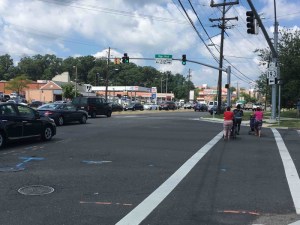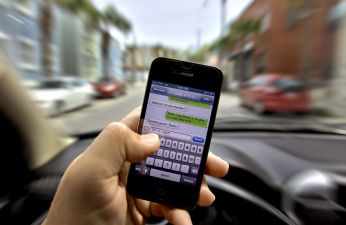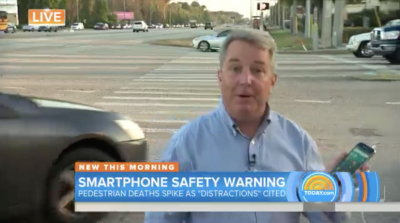Inside the Latest “Distracted Pedestrians” Con
Hospital records from 2014 showed that distracted walking accounted for 78% of pedestrian injuries throughout the United States.
— Daily News, Sunday, March 27, 2016
A report released in 2015 by the Governors Highway Safety Association found an increase in pedestrian fatalities, and cited texting while walking as partly to blame. Nearly two million pedestrian injuries were related to cellphone use, the report said.
— Philadelphia Inquirer, Friday, March 25, 2016
Attempts to repress human-powered movement invariably arise from three elements: a penchant for victim-blaming, officials’ “windshield perspective” that marginalizes and devalues people outside cars, and dubious statistics. All three, especially the last, have lately been on prominent display in New Jersey, where a member of the General Assembly has introduced legislation prescribing $50 fines and up to 15 days in jail for anyone operating a hand-held device while walking on a public thoroughfare in the Garden State.
While the quotes above appeared after the legislation was unveiled, the memes they embody have been around for awhile. The first quote, from the Daily News, originally ran in that paper in 2014. Here it is in full:
Distracted walking, like texting, emailing, Facebooking, tweeting, and Instagraming while stepping through the city streets, has accounted for 78% of pedestrian injuries across the country, a recent review of hospital records found. Daily News, Wednesday, August 6, 2014.
The second quote, from the Philadelphia Inquirer, followed a slightly more nuanced version from the Governors Highway Safety Association’s 2015 report, Everyone Walks:
Taking into account… research that suggests that the number of traffic crash-related injuries suffered by distracted drivers is actually 1,300 times higher than CPSC [Consumer Product Safety Commission] national estimates, [Ohio State University] researchers projected “there may have been about 2 million pedestrian injuries related to cell phone use in 2010.”
As I show below, both assertions fall somewhere between bizarre and downright false. And both emanate from a single source: a 2013 article in the peer-reviewed journal Accident Analysis & Prevention. That article, “Pedestrian Injuries Due to Mobile Phone Use in Public Places,” by Ohio State University planning professor Jack Nasar and Ohio DOT engineer Derek Troyer, isn’t solely to blame for the first misstatement, but it’s squarely on the hook for the second.
Rebutting the claim that distracted walking accounts for 78 percent of U.S. pedestrian injuries
This one’s straightforward. The Ohio authors wrote in AA&P: “For pedestrians, talking on the phone accounted for 69.5% of estimated injuries, while texting accounted for 9.1%.” The sum of those percents (after rounding, presumably) is 78 percent, which is the percent in the Daily News stories. Unremarked in that sentence, however, is that the study in question was not looking at all pedestrian injuries, but only pedestrian injuries related to mobile phones. We thus have the unremarkable finding that most pedestrians who were using a mobile phone when they were injured in traffic crashes were talking or texting — as opposed to, say, switching playlists or posting on Twitter.
Federal data readily confirm that the number of mobile phone-related pedestrian injuries is relatively tiny — probably 40 times smaller than all pedestrian injuries. Thus, if talking or texting were reported in 78 percent of pedestrian injuries involving mobile phones, it follows that these factors are present in just 2 percent of all pedestrian injuries — a fairly trivial share, and one that squares with reports of hundreds of grievous pedestrian injuries reported in Streetsblog over the years.
A quick glance makes clear that the AA&P article addressed solely mobile phone-related pedestrian injuries. Apparently, the 2014 Daily News reporter and her editors blew past the context, took for granted that the percentages applied to all pedestrian injuries, and put the startling but false statistic into her story. Then last week, when the NJ legislation was introduced, the new reporter on the beat found her story and repeated the misinformation.
Rebutting the claim that nearly two million pedestrian injuries a year involve pedestrians’ cellphone use
This claim starts with the federal Consumer Product Safety Commission’s compilation of U.S. emergency room admissions from 2004 to 2010 for “injuries related to mobile phone use” in public places for pedestrians and bicyclists. From that data, the AA&P authors took the 2010 figure, 1,506, of which four-fifths were pedestrians and one-fifth cyclists. (To easily distinguish these categories from motorized travelers, they denoted the combined subsample as pedestrians.)
Here’s where it gets weird. The same CPSC data for 2010 somehow show only 1,162 mobile-phone related injuries among drivers, according to the AA&P authors. Yet federal data for the same year show 1,542,000 total injuries in U.S. “police-reported motor vehicle crashes.” Evidently dividing one number into the other, the authors concluded in their AA&P article that “for drivers using mobile phones, the number of crash-related injuries are about 1300 times higher than the CPSC national estimates of emergency room injuries.” Proceeding to multiply the CPSC’s figure of 1,506 injuries to pedestrians by the same factor of 1,300, they conclude: “If similar numbers apply to pedestrians, then the 2010 national estimate from emergency rooms may reflect about 2 million pedestrian injuries relate[d] to mobile phone use.”
That could be the wildest extrapolation you’ll see in any peer-reviewed journal this decade. “Only” 66,000 pedestrian injuries a year are recorded in official U.S. traffic crash data, yet the AA&P authors speculate that there may be 30 times as many attributable to mobile phone usage alone.
What’s most shocking is that this outlandish figure was incorporated into the Governors Association’s Everyone Walks report: “[T]here may have been about 2 million pedestrian injuries related to cell phone use in 2010.” It’s been clear to me for some time that the GHSA is little more than a front for feckless state “highway safety” panjandrums like New York’s Governor’s Traffic Safety Committee, which dispenses county grants for police seat-belt checks and “Child Passenger Safety Programs” and is generally mired in a 1950s-era mindset in which the only road users are those inside vehicles. Nevertheless, to unsuspecting reporters, the GHSA is embossed with the imprimatur of “highway safety,” meaning its misinformation carries weight.
“Victim blaming is a subtle process, cloaked in kindness and concern,” wrote sociologist William Ryan over four decades ago. Battling victim-blaming along with the pervasive windshield perspective is hard enough without having to contend with bogus “statistics” as well. The Governors Highway Safety Association and Accident Analysis & Prevention have some soul-searching to do.


